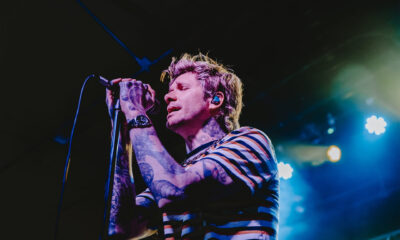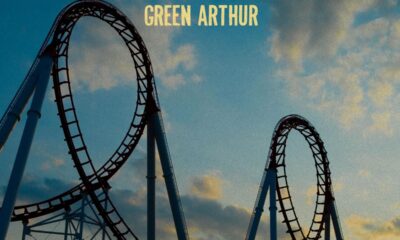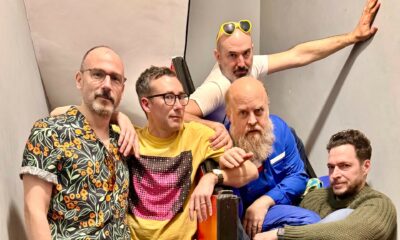Hardcore/Punk
Sparta and At The Drive In’s Jim Ward Speaks at Length About His Brand New Solo Record ‘Daggers’ [w/ Audio]
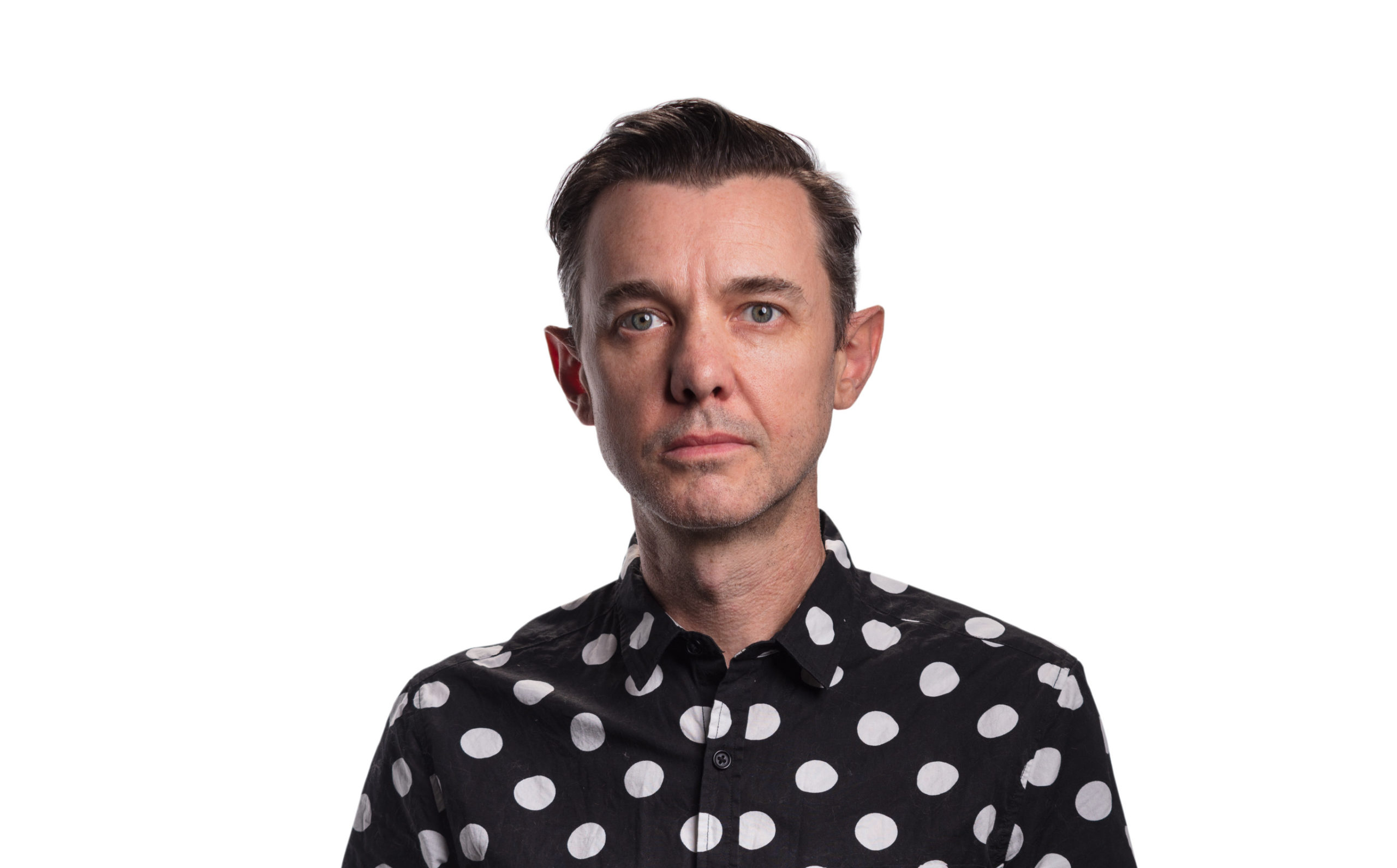
In 1994 (and at the age of 17), Jim Ward co-founded the iconic post-hardcore band At The Drive-In. The band released three critically acclaimed studio albums and several EPs before disbanding in 2001. From there, Ward went on to form Sparta (who released Trust The River last April). Ward has also released a slew of solo albums and fronts an alt-country project, Sleepercar. He lives in El Paso, Texas, with his wife, where they run a restaurant together.
Along with the help of Incubus bassist Ben Kenney and Thursday drummer Tucker Rule, Ward takes his new record Daggers into some surprising and spectacular places. Written in isolation as a way to escape from the pandemic, Ward realized the songs that would become Daggers (self-described as his first solo rock record), and it’s some of his strongest material to date! Ten songs totalling over 40 minutes worth of material that is sure to please any fan of Jim’s previous two decades worth of recordings.
Do not sleep on this record, it’s a banger from the get-go. If Canada can get its pandemic-riddled head out of its ass, we might even be lucky enough to see some Canadian live dates around this killer release. Our heartfelt thanks to Jim Ward for taking a healthy chunk out of his afternoon last week to field a few questions for V13.
Daggers wasn’t at all what I expected at all when I played it. I expected something more singer-songwriter and kind of minimalist.
Jim Ward: “(laughs) Yeah. That’s the best start to an interview I’ve had in a long time.”
I don’t know, I read the preamble, and it was like, personal, written during lockdown; no band. So I’m like, “Ok, it’s going to be like singer-songwriter and acoustic.
“Nope. Definitely not.”
Can you talk a little bit about how you demoed Daggers up and when you decided to share it out and expand it?
“Essentially, it was written as sort of my need for mental health care. We own a restaurant, My wife and I own a restaurant here in El Paso, and we had a record that came out in April last year. So our world crumbled pretty quickly, and we were scrambling. I think the first few months of the pandemic we really spent trying to take care of the people around us. Like staff, people with kids, trying to keep the business in a position to live through this kind of thing. Then I sort of got to the point where all of that had taken its toll, and I just needed a little bit of therapy. So I started just playing guitar late at night, which is when I tend to write. And I write on an electric plugged-in; that’s the way I usually write.
I wrote a couple of riffs, and I thought, well, this would be fun to sort of expand on. So I called Tucker and just said, ‘Hey, I’m writing this stuff that’s pretty heavy. Do you want to play drums and do demo drums on some of the parts?’ We’re buddies, and he doesn’t have anything to do, and I don’t have anything to do.
I would say within two or three weeks, it was pretty much done. I was writing every day, then I would send it to him, and he would send them back, and then we called up Ben and showed him what we were doing. He made a few suggestions on arrangements, and then that was it. Tucker did all of the drums in one day, and then he sent them back, and I blended a bunch of the demos into the finish drums and did more guitars. Ben played some bass on it and sent it back to me, and then I sang on it.
Initially, we just wanted to do something more for fun and maybe put it out before the election as kind of a middle finger to Trump kind of thing, what little that we could do. But I’d say about halfway through, I sent it to Dine Alone Records just to get their two cents. I’m under contract with them, so I sent it to them just for the blessing of either us putting it out on the internet or whatever you want to do with it. And they said, ‘we think this is pretty awesome. We would rather treat this as a full record.’ I think from that point on, that’s when it got a little more serious for me. As in, it’s obviously turning into something I didn’t expect. So I’m actually with you; when you say it wasn’t what you expected? This music is not what I expected at all.
It just took on a life of its own. And I think part of that is in those troubled times, I sort of went back to the stuff that makes me comfortable and happy. And a lot of that was the early stuff that made me love music in the first place. I love to play guitar. It’s this comfortable, protective kind of environment. And then I surrounded myself, obviously, with friends that I love and trust and with who I just wanted to make music with and not make it a big deal. Do you know what I mean? I didn’t say, ‘you guys should do this or that.’ I just sent them the songs and said, ‘do whatever you want. Whatever you do, I’m going to love.’ And that’s it. And I never changed anything, not a note.”
Is this the first time you put music like this together without stepping into a studio?
“I do a lot of work from home, and then that will evolve into a studio. But this is definitely the first time that there was never a studio. I’ve never been in the room with anybody on this record, not even mixing. All the mixing was done remotely and just sent back and forth. I’ve never been in a room with anybody on this record.”
That’s pretty wild.
“Yeah, it’s insane. I’ve never done that.”
So Dine Alone says, “We think we should release this as an album.” At that point, did you have to do anything else to the material? Were you worried that it wasn’t, you know, sound quality enough? Or did you just let them go, and that’s what you’re pressing?
“I think that there was this general consensus. They heard probably three demos where I had rough vocals on them. I think I sent them ‘I Got a Secret.’ I think I sent them maybe ‘Foreign Currency,’ and maybe one other. And when I sent those three, I think that the general consensus was that the songs were strong, so we would just build upon that. But by the time, I think at the end of it, it was overwhelmingly obvious that this was going to have a bit more life than we thought it would. It was just happenstance. It was nothing I did or nothing anybody involved did; it’s just sometimes things work out that way, Right?
So I don’t think there was any taking things more seriously when they said that, but I definitely didn’t worry. I don’t ever release anything I’m not happy with. But I will say this process is way more smooth. I’m pretty famous for recording multiple versions of records, like two or three times. What you hear in this; almost all of it has demos in the actual finished record. So there’s no demo and then the finished recording; there are actually pieces of the demos in the finished recording.”
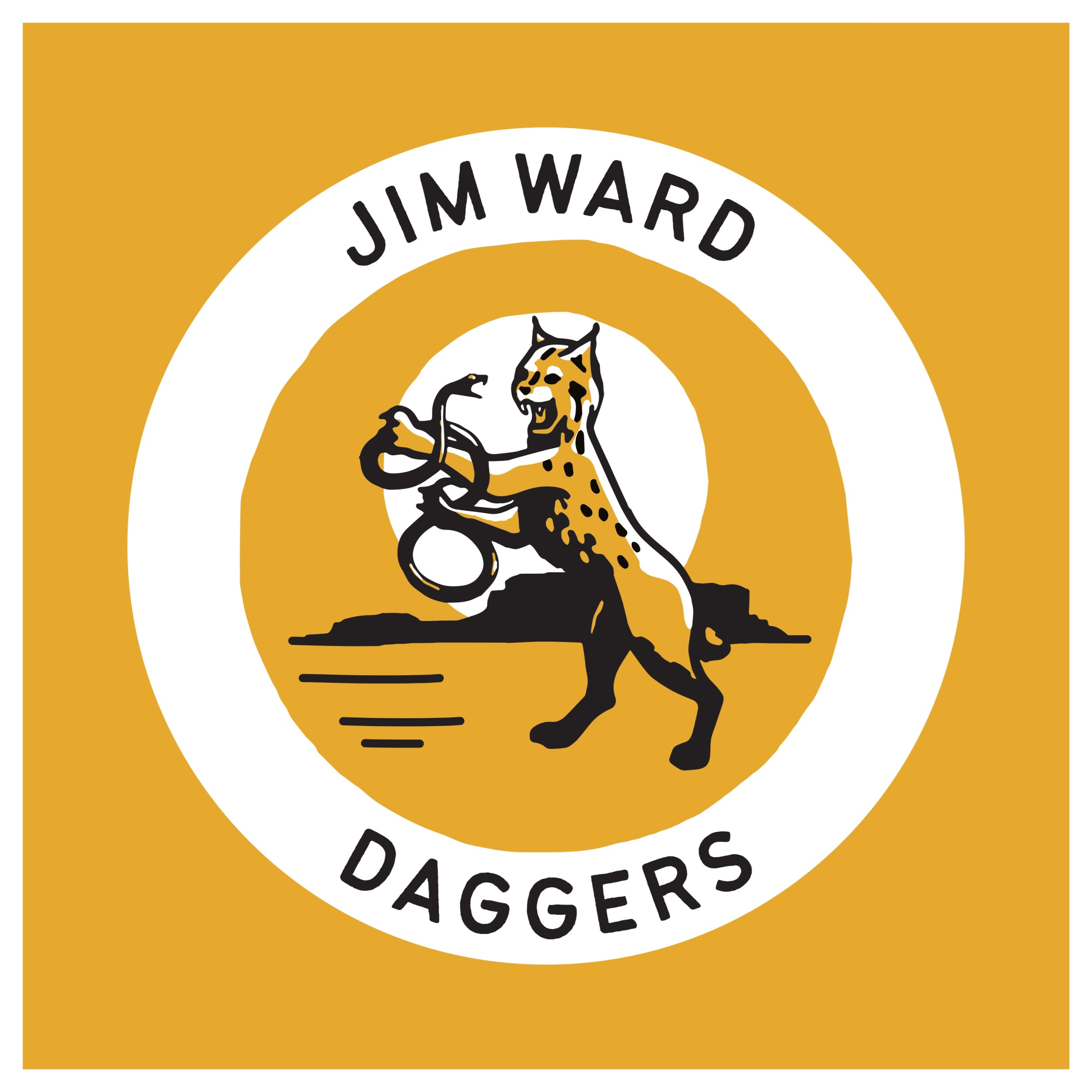
Artwork for ‘Daggers’ by Jim Ward
The album sounds very realized. Like you all rehearsed together and put a bunch of thought into it.
“I know! It’s insane. It doesn’t make any sense to me because the harder you try to do that, the harder that is. And then, in this case, it was just that easy. As silly as it sounds, I would send something to Tucker at 10 in the morning, and at 3 in the afternoon, he would send me back a finished drum part. We didn’t change any of it. He went and recorded it in a studio, so we had better tracks, but none of it was like, ‘Oh cool, well, let’s keep working on it.’ It was like, ‘Oh, perfect, alright, let’s just go to the next one.’ And some days, he would send me two. It really is as crazy as it sounds. We were equally as shocked.”
How important is the ideal of releasing an album to you now in this current musical climate? Do you feel like it’s still a valid entity?
“I would say that. I posted this on Instagram the other day; I just got my shipment of vinyl for me, and holding that record, yes! So this is the first solo record I’ve ever had on vinyl. This (Daggers) is the first time I’ve ever seen my name on a 12-inch record, and it was overwhelmingly emotional for me, and I think that answers your question. It’s so important for me that you take the time to figure out what songs fit on a record. And how they fit in the order. And who is going to do the artwork. And how you’re going to package that. And how you present that to the world. It’s everything to me, to be honest with you.
And I would say as a musician and artist, I’m 100 percent, or let’s say 95 percent, obsessed with writing songs. I don’t like to practice; I’m not a huge road guy, I don’t need to be on tour all the time, I don’t care about that stuff as much. What I really want to do is make things. So for me, the ultimate finish line for making something is to have it on a record or a CD, but a record is just so much more real.”
Yeah, and in vogue right now.
“Exactly. It’s back. Which is great, except that it took a really long time for this record to come out because everybody is making records, and there are not that many record plants anymore.”
Right. True enough.
“So when they put me on the schedule… You know, I finished it in October, and they’re like, ‘Well, it’s going to come out in June.’ And I was like, ‘Fucking June?!? I really want to show this to people!’ So I kept pushing as hard as I could, but the record plant is the record plant. It’s no surprise to anybody that a lot of people made records last year.”
No. I mean, that’s the way that it is. At least Dine Alone said that realistically it’s June. Because they could have said, we’ll take your pre-orders now, and then all of your purchasers are waiting eight months and sending you notes going, “Hey, where’s my product?” Right?
“And they’re so cool because when they told me, we won’t give you a release date until we have a guaranteed production date because we don’t want to do that to people (to fans). And that’s why I love Dine Alone. So this is also the first time I’ve ever released a second full-length on a label consecutively. I’ve never had two records on a label in my life, like two full-lengths. Which is crazy if you think about it. But every single full-length has been on a different label until this.”
Wow, I didn’t know that. So you’ve been at this now for well over 20 years, I would say, if I’ve got my math right. Do you feel like your approach to songwriting has gotten easier over time?
“I would say the irony of this record is that this is probably as close to my approach to writing songs as I was doing for Acrobatic Tenement, which is the first At The Drive-In record. Standing in the corner of a room late at night with an electric guitar, not plugged in, so I don’t disturb my family. You know, a different family now, because I was 17 then. Obviously, now I have my own family that I’m trying not to wake up. It’s probably the closest to that kind of energy and optimism and naivety. And I think part of that is just everything that I’ve gotten used to as an artist. Especially an artist that’s in that system, you know what I mean? Whether it’s on a major or you’re on a tour cycle, or it is what you do for your living, and it becomes a bit of a job. All of that stuff was taken away, whether I wanted to tour or not. I choose to take away some of those things. But some of them just got taken away because of the state of the world.
Then all of a sudden, I was back to the same exact position I was when I was 17, which was, I just want to play guitar because if I don’t, I’m going to fucking explode. And out of that came this record. I think it’s kind of, for me personally; it’s been a really nice reminder of why I love doing this so much and why just playing guitar is so important to me. Because you forget, you don’t want to become the job. You forget that it was the thing that used to keep you sane. And then it becomes a thing that is pushing your sanity to new stressful levels. I’m sure you have heard that a million times from people in bands, but it’s true.”
Well, after you release, and then release again, you’re chasing after something bigger and better, and you’re getting further and further away from, like you said, being 17 years old and just getting into a corner and writing and recording. So it’s weird that you’ve now found your way back to that because of a pandemic.
“Yeah, and some honest situations that happened in life, plus some real honest choices I made in not doing things for reasons that weren’t giving me any satisfaction. I’ve lived in the sub-genre for a long time. In this, I don’t know what you call it, but I’m saying this; I’m not rich. None of those things are important to me. And then you realize, ‘I can actually really enjoy what I do when I just start taking myself out of those things. That I don’t need to be there because I don’t care about the outcome of that stuff.’”
So these past 14 months have affected the world profoundly. Have you personally been surprised by anything? Habits that you’ve developed in lockdown? Things that you do differently day-to-day now than you did before?
“I would say that I’m definitely starting to realize; for us, we’re coming out of it quicker than I think we should. Texas especially is a bit of a concern. Whatever opinion you want to have about Texas. I love Texas, don’t get me wrong, but there are some dumb fucking people that run the state, and I think that it’s making me realize how much I do appreciate the stuff that we were doing in lockdown. Not because of the pandemic, which is awful. I’ll go to a funeral on Thursday for my friend that died of COVID. It’s still happening, and it’s still everywhere, and it’s still personally affecting me. But I will say taking long walks, and gardening, and making pizza at home, and not having a full calendar of shit to do has been awesome. Like reading books and, as cheesy as it sounds, just having a glass of wine with your partner and watching the sun go down. A lot of times, we just sort of skip over that stuff because you think, ‘I’ve got other things.’
Even with this record coming out, I’ve got three weeks to finish X amount of videos and press and whatever. And even in that, I’m finding it relaxed. I’ve been doing a lot of podcasts for this record because I think that’s becoming more and more popular in music press or whatever it is. But I go way over my time limit because I just like talking to people. Having this conversation with you is great. I don’t care about the 20 minutes that it says on the call sheet. I’ve just been enjoying connecting with people and learning. During the whole thing, I started a Patreon mostly as a way to connect because we weren’t going to be on tour; I wanted a way of connecting with fans in a more personal way and not just broadcasting on social media. So we put a really low fee on there mostly just to make sure the people that wanted to be there wanted to be there, you know what I mean?
But what I found is that I’ve had these really great conversations with people, some really meaningful interactions with people that I wouldn’t have had otherwise. So I think that’s kind of what I’ve taken from the last 14 months. As disconnected as it’s been, I’m more connected with people than I’ve been in a really long time.”
What’s your game plan for Daggers now? Do you think you’ll tour this? And if so, is it going to be with Ben and Tucker, or will you have to rehearse some people up?
“No (laughs), I think they have better gigs. I mean, I would love to, but no, they’re both busy. And I’m so grateful to them and everybody else who made this. It has my name on the front of it, but it took 30 people to make this record, and I’m eternally grateful to them and their friendship. It’s been such a cool experience to have with my buddies. Hopefully, I’ll get to play some shows with their bands, and maybe they can come out and do something with me. But the idea is Matt Miller from Sparta is going to be playing bass. And then we have this guy who plays drums with me sometimes, Matt Gardner from Australia is going to be playing drums, and we’re just going to do a three-piece.
And the cool thing is we get to sort of reinvent Sparta songs and songs for my other solo record and Sleepercar. So anything we want to do that we can sort of fit into the set, it’s sort of becoming a career spanning concept, which has been honestly really fun to imagine. Because to some degree, when you go out with Sparta, you are playing Sparta songs, the way people expect those songs to be played. And I think that’s fair, but when you get to do it differently, it’s really exciting for me personally because I get to sort of reinvent some stuff. I think it will just be fun, and it’ll be less pressure from fans to replicate what they love, which again, I think it’s totally fair.”
Cool. It’s so foreign to me listening to you talk like this because Canada is still very locked down. Certainly, Ontario is. I’m still under house arrest.
“Yeah, I know. I’m on Dine Alone. Of course, I know. My weekly conference calls are with people that are in your same position.”
It’s nuts.
“Our drummer can’t come right now, so we don’t know. We’re planning stuff in the fall, but I think we’re at the mindset right now where we’re going to sort of plan some really small things around El Paso, like a one-day drive kind of situation. And sort of hope for the best, and accept what it is. It’s fine if things don’t happen. I think this has sort of an open-ended feel. There’s no period on the sentence at this point. I’m going to just see where this goes and have fun.”
The material is strong, and I hope that people grab onto it for what it is. I like the way that Daggers starts off; kind of mellow. And you’re like, “Yeah, ok, this is about what I thought it would be.” And then it kicks in, and I’m like, “Oh man, this is a friggin’ rock record!”
“No, I keep telling people it’s not my first solo record, but it’s my first solo rock record for sure. And I love it; I’m having a blast.”
What song on Daggers did you find the hardest to write, and why?
“No one’s asked me that yet. I get, I will say… Fuck, I don’t know; that’s the crazy thing about this record; there were no real normal work struggles. there was nothing like songs being ‘It’s closed, but I can’t quite get there.’ It’s insane. Again, I keep going back to the absurdity of it is its own thing. I think maybe… Yeah, I couldn’t even honestly answer that. There’s nothing that left me stuck at all. It’s like it all came out really quickly and organically.”
And that’s not a bad answer.
“No, it’s not a bad thing. How lucky am I after this many years that, a. I get to keep making records, and b. I get one like this? It’s just kind of like a gift from the gods.”
Did you live stream at all during the pandemic?
“I did. I did a couple, just because (like I said) the Sparta record came out in April, and we had to cancel everything like everybody else. So I did a live stream, and I wanted to be respectful of as many time zones as I could, so I did three live streams in eleven hours, so I did three shows for Europe, North America, and Japan, and Australia. And then I did maybe two or three other ones. So I did about four or five in general.”
As an artist, did you find them fulfilling? Did it just feel kind of weird and disconnected? I’m curious.
“It definitely felt unnatural. Yeah, it felt like you were playing to a camera. When I started on one of them, I was able to see comments while I played. And that started to sort of make it less unnatural because I think that I got to see that there were human beings there, even as it was distracting me. At one point, I fucked up because somebody made me laugh, which was the best thing because that’s what would happen at a show. And I would have no problem saying, ‘Oh, you just made a face that made me laugh so hard. I can’t play the song because you’re being silly or whatever it is.’ I like that stuff; that’s the part of live music that I like; the realness and the interaction, the social part of it.”
The live imperfection.
“Yeah, I don’t care about that (laughs). Everyone will tell you that.”
Let me ask you this, a 16 year old asks you for your advice on pursuing a career in music; what do you tell them?
“Tour. It’s always the same answer. If that’s what you want to do, if you want to play, then my advice is always to tour. The reason I say that is because a. it is the greatest. I don’t know what the right word is… When I’ve toured with people and they last one tour, and they just decide that that’s not what they want to do, it’s a really easy way to find that out. So I don’t know what the right phrasing for that is. But I think it’s a really good way to make you realize how much you want to do it, and to what level. So I think touring is so important because you could go out and do a tour and go, ‘You know what? I really love playing music, but I don’t think touring in an original band is for me. I think maybe I want to just go home every night, so I’m going to find some way of playing music in that situation.’
Or you’re hooked, and then the rest of your life is going to be (for better or worse) taken over by this. Also, I think it’s a great equalizer when it comes to determination and intention. Because I think people that want that kind of thing (like the ceiling of notoriety) if that’s why you’re playing for the whatever you want to call it. Like the sex, drugs, and rock n’ roll sort of aspect of it. I think that gets de-mystified. I don’t think that’s a word.”
That’s a word.
“You know what I mean? When you go out, and you realize that you’re going to play to one or two people and there’s no glory in it, then you’re just doing it because either you love it, or maybe that’s not what you should be doing, right? And I think the whole thing is the harder you work, the luckier you get. That applies as well to touring.”
-

 Alternative/Rock6 days ago
Alternative/Rock6 days agoThe Warning Shake the Foundations of a Sold-Out Leeds Stylus [Photos]
-

 Music2 weeks ago
Music2 weeks agoTake That (w/ Olly Murs) Kick Off Four-Night Leeds Stint with Hit-Laden Spectacular [Photos]
-

 Alternative/Rock6 days ago
Alternative/Rock6 days agoThe V13 Fix #011 w/ Microwave, Full Of Hell, Cold Years and more
-

 Features2 weeks ago
Features2 weeks agoTour Diary: Gen & The Degenerates Party Their Way Across America
-

 Indie6 days ago
Indie6 days agoDeadset Premiere Music Video for Addiction-Inspired “Heavy Eyes” Single
-

 Folk7 days ago
Folk7 days agoKatherine Perkins Strikes the Right Tone with Her “Hold On” Music Video Premiere
-

 Country1 week ago
Country1 week agoBrooke Ashton Chats About Her “Someone” Single, Creative Process, and More!
-

 Culture3 days ago
Culture3 days agoRob Lundberg’s “Uncontaminated Sound – The Interviews” EP #67 w/ Joshua Farinella of The Whistleblower



